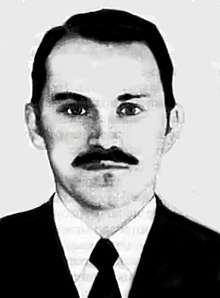Aleksandr Akimov
Aleksandr Fyodorovich Akimov (Russian: Александр Фёдорович Акимов; 6 May 1953 – 11 May 1986) was a Soviet engineer who was the supervisor of the shift that worked at the Chernobyl Nuclear Power Plant Reactor Unit 4 on the night of the Chernobyl disaster, 26 April 1986.
Aleksandr Akimov | |
|---|---|
Акимов Александр Фёдорович | |
 | |
| Born | Aleksandr Fyodorovich Akimov 6 May 1953 |
| Died | 11 May 1986 (aged 33) |
| Cause of death | Acute radiation poisoning |
| Citizenship | Soviet |
| Alma mater | Moscow Power Engineering Institute |
| Known for | Shift supervisor of Night shift at the Chernobyl Nuclear Power Plant |
| Awards | Order For Courage |
Biography
Aleksandr Akimov was born on 6 May 1953 in Novosibirsk, Russian SFSR (Republic of the Soviet Union).
In 1976, Akimov graduated from the Moscow Power Engineering Institute, with the degree of specialist in engineering and automation of heat and power processes.
He began his career at the Chernobyl Nuclear Power Plant in September 1979. During his first years at Chernobyl, he held positions of senior turbine management engineer and shift supervisor of the turbine hall.
On 10 July 1984 Aleksandr Akimov was appointed to the position of shift supervisor of Reactor Unit 4.[1]
Chernobyl disaster
On the night of 26 April 1986, Akimov was on duty as the shift supervisor of the 4th power unit. The reactor power level had been reduced, preparing for a planned safety test. Akimov refused to do the test due to its low and unstable condition but was overruled by Anatoly Dyatlov. However, the power reduction had been too abrupt, which put the reactor into a "poisoned" condition (a buildup of 135Xe, a strong neutron absorber), and made the reactor stall. Raising power after this point put the reactor into a potentially dangerous state, unbeknownst to the operators. The turbine was shut down. The test was completed and the AZ-5 ("scram") button was pressed to shut the reactor down. The control rods had graphite moderators to speed up reaction and the other part of the rods were made of boron to decrease reaction. As the rods were being inserted, the graphite tips of the control rods accelerated the reaction, creating neutron flux in the bottom of the core. This further increase in power caused the reactor to explode. The communications networks were suddenly flooded with calls and information. Akimov heard reports of massive reactor damage, but did not believe it, and as a result relayed false information about the state of the reactor for hours after.[2]
Akimov worked with his crew in the reactor building after he learned the extent of the accident. The work done would last until the morning hours of the 27th by trying to pump water into the exposed reactor core. Unknown to Akimov, during his work he was exposed to a lethal dose of radiation that was later determined to be 15 Gy.[3] At some point he gave deathbed confessions stating repeatedly: “I did everything correctly. I don't understand why it happened.” Akimov eventually succumbed to acute radiation syndrome two weeks after the disaster at the age of 33.[4]
Recognition
In 2008, Akimov was posthumously awarded with the 3rd degree Order For Courage by Viktor Yushchenko, then the President of Ukraine.[5]
He was portrayed by actor Aleksandr Khoroshko in the 2004 Zero Hour television series, by Alex Lowe in the 2006 BBC production Surviving Disaster: Chernobyl Nuclear Disaster[6] and by Sam Troughton in the 2019 HBO miniseries Chernobyl.
See also
References
- Татьяна, Грива. "Герои-ликвидаторы". chnpp.gov.ua.
- Barringer, Felicity (April 22, 2001). "The World; Life After Death: Chernobyl Today". The New York Times.
- Serhii Plokhii (2018). Chernobyl: The History of a Nuclear Catastrophe. Basic Books.
- Nuclear Engineering International. 35. Heywood-Temple Industrial Publications Limited. 1990. p. 51.
- "Presidential Decree No. 1156/2008 of 12 December 2008". zakon.rada.gov.ua.
- "Surviving Disaster" Chernobyl Nuclear Disaster (TV Episode 2006) on IMDb
6. Рыжиков, 1994, с. 138.